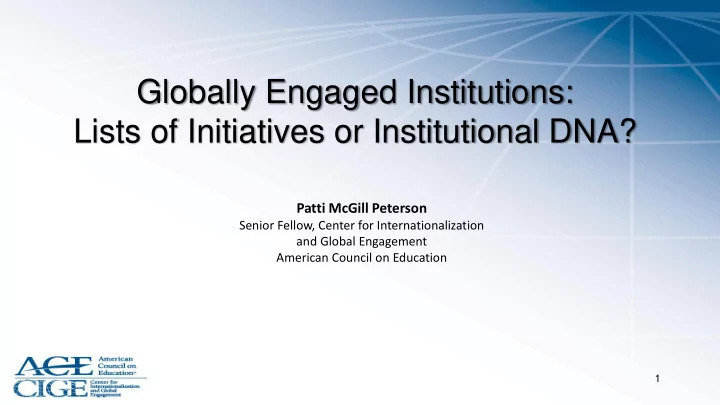

Globally Engaged Institutions: Lists of Initiatives or Institutional DNA? Patti McGill Peterson Senior Fellow, Center for Internationalization and Global Engagement American Council on Education 1
TERMS Globalization – interaction among people and organizations of different nations, frequently driven by economic and political interests. This process impacts culture, political systems, economies, and the environment. It is not a new phenomenon but now a more intensive one. Internationalization – the process of integrating an international, intercultural, or global dimension into the purpose, functions and delivery of higher education. Global Engagement – the ways in which institutions of higher education reflect their relationship with the rest of the world through various dimensions of institutional activity. Global Learning – allows students to explore what connects them to the rest of the world; enables them to engage with complex international and global issues and examine links below their own lives and societies, cultures and issues throughout the world. 2
Comprehensive Internationalization 3
Administrative Coordination Percentage of institutions with a full-time administrator who oversees multiple internationalization activities or programs 4
Study Abroad Percentage of institutions indicating education abroad participation has increased, decreased, or remained the same in the last three years (2016) 5
International Students Percentage of institutions hiring overseas recruiters to recruit international students 6
Internationalizing the Curriculum Percentage of institutions engaged in efforts to internationalize the undergraduate curriculum 7
Faculty Awards and Tenure Percentage of institutions that consider international work or experience in promotion and tenure decisions and/or offer faculty awards for international activity 8
Global Learning Objectives Knowledge • Knowledge of world geography, conditions, issues and events. • Awareness of the complexity and interdependency of world issues and events. • Understanding of historical forces that have shaped the current world system. • Knowledge of one’s own culture and history. • Understanding of the diversity of values, beliefs, ideas, and worldviews. Skills • Technical skills to enhance students’ ability to learn about the world (e.g., research skills). • Critical and comparative thinking, including the ability to think creatively and integrate diverse cultural frames of reference. • Communication skills, including the ability to use another language effectively and interact with people from other cultures. • Coping and resiliency skills in unfamiliar and challenging situations. Attitudes • Tolerance for ambiguity and unfamiliarity. • Respect for and appreciation of personal and cultural differences. • Empathy and the ability to see multiple perspectives. • Self- awareness about one’s own identity and culture. 9 American Council on Education (ACE)
Global Learning Value Rubric A critical analysis of and an engagement with complex, interdependent global systems and legacies and their implications for people’s lives and their sustainability Global Self-Awareness Perspective taking Cultural Diversity Personal and Social Responsibility Global Systems Knowledge Applications American Association of Colleges & Universities (AAC&U) 10
Curricular Elements for Global Learning 11
Faculty Development Percentage of institutions offering faculty development funding, programs, and opportunities 2016 2011 40 30 30 21 19 30 15 25 23 1 5 12 11 12
Parameters of Institutional Mission 13
“The purpose of college is not just to transmit skills. It is also to widen your horizons, to make you a better citizen, to help you evaluate information, to help you make your way through the world…..” 14
Recommend
More recommend